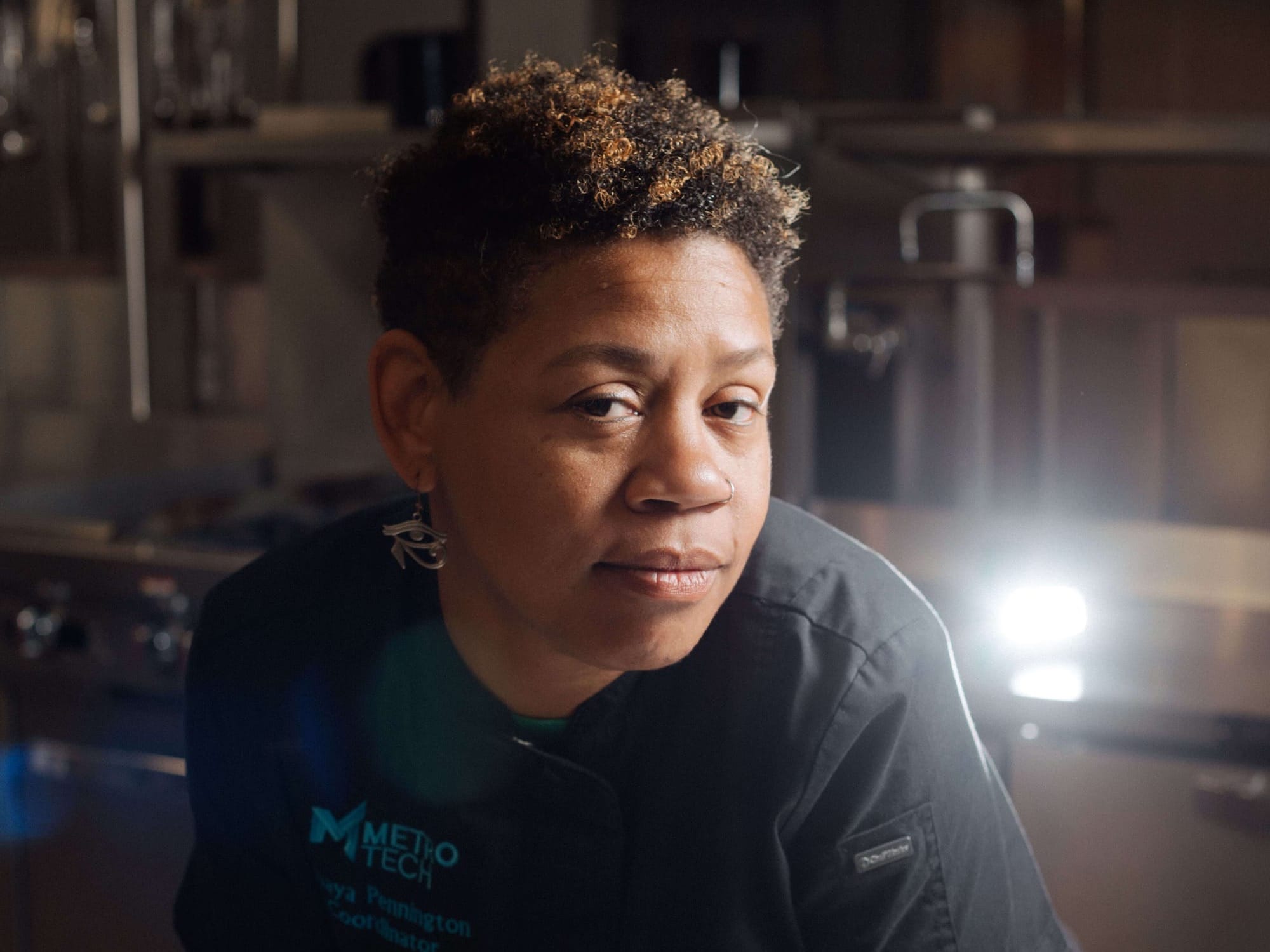
By the time Robert Irvine showed up to do an episode of “Restaurant: Impossible” at Urban Roots in OKC’s Deep Deuce, Chaya and Michael Fletcher’s restaurant was roughly a year away from closing. The episode aired in 2014, and the restaurant, which opened in 2010, shuttered in 2015. It was the last Black-owned business in the historic Black neighborhood, once famous for a thriving jazz scene. In fact, Chaya’s uncle played jazz in the building, a venue with a history that goes back to the 1920s and includes performances from Count Basie, Billie Holliday and Duke Ellington, among others.
“My grandmother and mother waited tables in the building,” says Chaya, who has reassumed her birth name, Pennington. “We knew we were going in undercapitalized, but that’s what a lot of Black-owned businesses do. It was a point of pride to invest in the community, to put a Black space for Black people in a historically Black neighborhood. It was important to us to invest in our community.”
Pennington is the daughter, granddaughter, great-granddaughter, etc., of generations of educators and chefs. In her role as bar owner, restaurant professional and culinary coordinator at Metro Tech, she represents both sides in the nature vs. nurture argument — and at 45, she said she still hasn’t decided if she’s committed to a career in food.
She catered her first event at 13, helping her teacher mother who had a side gig as a party bartender. From that point on, the opportunities seemed to line up in a way that lit a path straight to hospitality. There were early jobs with two large companies well-known at the time — Dub Adams Catering and Harry’s Gourmet To Go — but things really began to gel when Chef Kurt Fleischfresser invited her to be a part of his Coach House apprenticeship program, a structured education that eventually graduated 45 trained chefs.

“Kurt was the first person I’d call a chef who hired me, and also the first who fired me,” Pennington says. She was 19 when she joined the program, motivated to make a decision about her future by her experience at Oklahoma State University. “I was failing. I’d chosen the old hotel-restaurant management program because I had to pick a major, but I was failing out, and I didn’t enjoy school.”
Fleischfresser said he brought Pennington into the program because he was impressed with her spunk and drive. “I never had more than a few women in the program, and I was always looking for good candidates, because I believed they made the program better.”
When Fleischfresser fired her from the program — causes related to youth that many of us have experienced along the way — she was already working back of house at The Metro Wine Bar & Bistro. Pennington said she found “her people” in the back of house environment.
“Because they were educators, my family pressured me to go to school, but I felt validated in kitchens, but I still felt like I needed to do more,” she says. “(Metro owner) LaVeryl Lower and I bonded over many things, including the Wanda Jean Allen case, and that made it easier to be the first Black woman in the kitchen.”
“I’m a third generation East Side resident. I grew up here, went to school here, raised my family here, am an educator here, own a business here. It’s a point of pride.” –Chaya Pennington
It’s a subject that is lurking around the edges: Pennington has a list of firsts, especially first Black woman in Nichols Hills restaurant kitchens, first Black woman in the Coach House apprenticeship program, first Black woman in the kitchen at what is now A Good Egg Dining Group … and she hasn’t stopped living into the list. Wanda Jean Allen was a Black woman convicted of murder and sentenced to death in 1989. Many Oklahomans no longer remember the case, but Pennington’s maternal grandmother was part of the statewide, grassroots anti-death penalty movement. Finding kindred spirits in kitchens made it easier to work in those spaces, especially in that time when the industry was incredibly white and male.
“The apprenticeship program still provided an education of sorts for me,” Pennington says. “I learned patience. I learned how to build and foster relationships across differences. I learned that to change a city, you have to commit to your craft and your neighborhood. There were very few chefs in Oklahoma City then, but there were people like Donna Ragozzino making dope-ass food at Terra Luna, and I wanted to do that kind of thing.”
The rest of her curriculum vitae is full of front and back of house jobs, management, catering, co-owner of Kindred Spirits, completing Platt College’s program — “because my teacher mother believed that the piece of paper is how you measure success” — and now mother to three, educator, bar owner, event organizer and an even longer list.
“I don’t regret doing what my mother wanted,” she says. “I learned things at Platt. But I believe now, and teach my students, that the best education comes from doing the job, especially with a variety of chefs who can teach you different things. I’d rather do the job every day than learn about it in school.”
Her students at Metro Tech “win whenever we show up,” as Pennington puts it. “We’ve built a strong culinary team of educators.” The students have been to FCCLA nationals three years in a row, and won multiple awards at the state competition this year. The team is solid, but Pennington’s determination and broad-based experience drive the machine. Her three sons have all worked in and around hospitality. The oldest, Mekhi, is an aspiring chef; the twins, Mason and Michael, just graduated high school, and are both headed for college.
Fleischfresser, who regularly hosted Pennington’s students when he was at Vast, says he’s proud of who she has become: “I’m amazed how she’s everywhere, doing so many things. I’m happy that I got to be a minuscule part of what she’s done for her students.”
As for her accomplishments, Pennington has a surprising list of what she’s most proud. “I’m a third generation East Side resident,” she says. “I grew up here, went to school here, raised my family here, am an educator here, own a business here. It’s a point of pride. It’s critical to invest in the community you want to be a part of, point of origin or not. I’m proud of that failed business (Urban Roots) because we go into every opportunity undercapitalized, but we do it anyway because we love our community.” •

